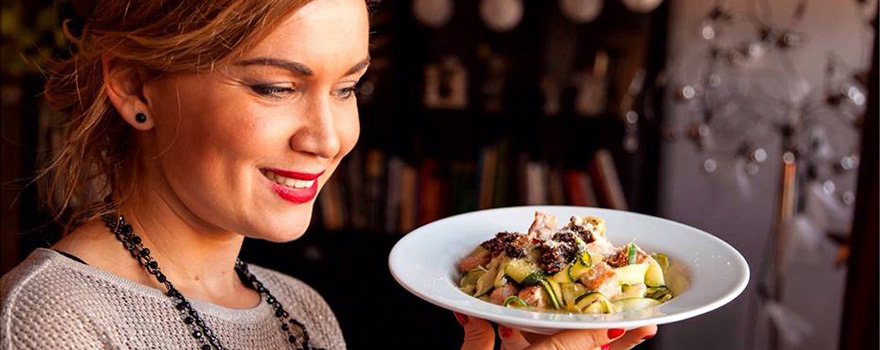We receive numerous inquiries and questions from expats about how to lead a health-conscious lifestyle in Hungary. Our interview with dietary consultant Barbara Virágh aims to answer these questions. Barbara is not only glad to help her fellow compatriots, but also gives lifestyle and dietary advice to foreigners too.
Barbara Virágh is a breath of fresh air for those seeking a healthy lifestyle. A dietary and lifestyle consultant she has many years of experience, and does not believe in abstinence or rigorous restrictions. Barbara plans customised diets, holds presentations about nutrition, organises workshops on healthy gastronomy and is learning psychology at the same time. She is a regular guest on various lifestyle programmes and her articles frequently appear in magazines.
We interviewed Barbara about nutritional awareness and useful tips. And of course, we asked her about how to eat healthily without losing the enjoyment of it all.
If we enter your name in a search engine the first thing that pops up is your website The Choice.What does “choice” mean for you?
I used to have weight and health problems that made me change my lifestyle and be more conscious about what I take into my body. I had a totally different job back then: I was a TV editor and reporter. I committed all the mistakes people on diets make: endless numbers of miracle diets, I tried different powders, pills, I starved and tortured myself. Unfortunately, these all had a negative effect, which made me realise I had to come up with a new system in which I never have to starve, yet I can stay healthy and fit. This was the point when it all began.
I gradually learned what is good for my body, how it works, how it reacts to certain things, and I set out on this new path. I completed a nutrition and lifestyle consultancy course and the sports coaching course at Semmelweis University, and there was no stopping me then. For me, the Choice means that we are capable of taking the lead, and it is solely up to us how we exist in our bodies. You must never stop after a failure or relapse, since you always have the option of starting over again, whether we are talking about lifestyle changes or healthy eating. In addition, to me it symbolises infinite opportunities, specifically, the fact that even in the world of “reform nutrition” you can have a divine meal and you don’t have to live on 3 dishes for years.
People often mix up “healthy food” with the derogatory term of “rabbit feed”. How can you pursue and stick to dietary change without compromises?
I know this is what most people fear when they set out on a path of nutritional awareness and begin a diet. I can truly say about myself that I love eating and I crave culinary experiences, and I firmly believe that this can be linked with healthy eating. When I first discuss this topic with someone, I always tell them not to imagine my life as consuming only air and seeds that I complement with some cucumber every now and then…. Not at all.
During these personal consultations I also aim to collect as many dishes as possible that the person likes to eat, so we can compile a really exciting and diverse menu.
In actual fact, all meals can be prepared in a healthy manner, at most only a few ingredients need to be replaced by others and it will have a totally different effect on our bodies. In other words: changing your lifestyle shouldn’t mean giving things up, it’s rather getting to know a new world.
What opportunities are there today in Hungary for those who would like to eat healthily? To what extent are we health-conscious at all?
I think in this day and age it is not difficult to eat healthily. New organic/Paleo and healthy food stores are opening every day, there are new Paleo confectioners, and it is more and more common now to have cafés and restaurants where the menu offers dishes or cakes that are, say, 100% sugar-free or are made of gluten-free flour.
This is a very good ratio and I am always happy when I discover new places, or I get good recommendations from my friends. Luckily, restaurants and cafés are increasingly open to these trends. For instance, one downtown restaurant prepares a Paleo cake according to my recipe, and they have a special dietary offer on their menu based on my recipes too.
Anyway, you don’t really have to go to organic food stores any more. All larger supermarkets have the necessary ingredients to start a lifestyle change. You don’t need to think of fancy things either: if you don’t want to have quinoa porridge made with chia-seed, psyllium seed husks and almond-flour, don’t worry, healthy eating can be much less complicated and more straightforward too.
Many people are sceptical towards Paleo diets. They consider it a waste of money, or just a fad. What do you think?
I think what is ideal differs for everyone. This is why I always start with a personal consultation. We work in so many different ways that it would be a mistake to make everyone follow the same diet.
I believe Paleo diets are based on solid grounds, sugar, fast-absorbing carbohydrates and dairy products for example are not good for anyone, so I follow these rules quite strictly. However, there are certain extreme versions of Paleo that I think are unsustainable in the long run and are not healthy at all.
So-called healthy eating is often associated with whole-grain wheat, lean poultry, fish, a lot of vegetables and fruits. Does this work for everyone?
As I already mentioned about Paleo diets it would be a huge mistake to make everyone follow the same diet. The same things cannot work for everyone. The basic principles are the same of course. I’m firm on those. For instance, sugar cannot be part of a diet in any shape or form, only maybe as fructose in fresh fruits. This is not so hard to keep to I think, since we can choose from a number of organic sweeteners that can be used to prepare all kinds of food.
Is a dietary change possible even if someone has individual needs, for example, they eat raw vegan foods, or love meat, they are insulin-resistant or have a heart condition? Is there a solution for them too?
Model diets do not work because there are a growing number of people who have food sensitivities, so this must also be considered besides personal tastes. Unfortunately there are more and more insulin-resistant people who require a specific diet that is totally different from the diet of Paleo fans for instance. Vegetarians or vegans can eat in just as varied, healthy and dietary ways, but here we are talking about an utterly different system.
And we haven’t even mentioned factors like the age, gender and activity of the individual that are all vital too, since there can be huge differences in this respect as well, in terms of nutrient requirements for example.
All in all, there is a solution for everything and for everyone, but it is not necessarily wise to just download a model diet from a women’s website.
Many people are afraid of the excessive limitations. Following a fixed diet in a busy working week can be an arduous task.
My clients don’t get a fixed diet, I don’t tell them what to eat from morning till evening on Day 1, then on Day 2… this would be quite difficult to balance with work, family and school. Once I calculate the daily nutrient requirement of a person, I break it down into 5 meals a day (weighted and proportionately distributed), then I highlight options for breakfast, 10 o’clock snacks, lunch, afternoon snacks and dinner, that are designed so they can be eaten in any combination, so your daily menu is flexible and variable. I often get the feedback that this way the whole system is much easier to manage and is more realistic, since you cannot run into the difficulty of having an ingredient you can’t buy, or you don’t want to eat that day.
Does dietary change really mean a great deal of sacrifice? Many can’t imagine a day without bread and sweets.
It is very important to start something you can keep to for more than just two weeks, and you genuinely adopt it as your new lifestyle. If someone is unable to give up eating bread completely for example, I’ll add some sandwiches using whole-grain or rye flour to their breakfast. They will not gain weight if they consume just the given amount. We are much better off this way than if we get so mentally hungry for bread that we rob a bakery after the first week of the diet…
Would you share some of your favourite recipes with us?
Pumpkin seed flour and olive bread:
Ingredients:
5 eggs
approx. 3 tablespoons linseed flour
approx. 3 tablespoons sesame seed flour
approx. 1 tablespoon pumpkin seed flour
2-3 tablespoons olive oil or coconut fat
20 g chopped olives
salt, pepper, any other seasoning to taste
a pinch of baking soda
20 g of seed mix to spread on top
Preparation:
Separate the eggs and add the fat, baking soda, spices, flours and the olives to the yolk. Mix it and add water to loosen it so it is easy to stir, but not runny. Beat the egg whites (until shiny and stiff) then add the flour to the mix in three steps. Mix it gently to prevent the egg white from breaking. Then pour the mix into a silicone loaf pan or one coated with grease and lined with baking parchment; spread the seeds on top and bake in a pre-heated oven at 180°C for 35 minutes.
Reform American pancake:
Ingredients:
1 egg
50 ml coconut milk
one medium-sized banana crushed
80 g lean cottage cheese
20 g oat flakes
stevia or erythritol as sweetener
cinnamon to taste
one teaspoon coconut fat for frying
fresh fruits on or to the side of the pancake
Preparation:
Mix everything except for the coconut fat and the fresh fruits, and put small, palm-sized pancakes into the heated pan coated with the fat. Make it thick to prevent it from spreading, but not too hard. You can play around with the amount of the dry and wet ingredients a little. Fry on a medium heat to prevent them from burning. After a few minutes, carefully turn the pancakes and fry the other side for a few minutes.
You can prepare around 3 small pancakes from this.
Can non-Hungarians contact you too?
Yes, I am glad to hold consultations in English, and I can prepare the diets in English too.
Contact: viraghbarbara(at)thechoice.hu





